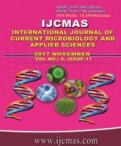


 National Academy of Agricultural Sciences (NAAS)
National Academy of Agricultural Sciences (NAAS)

|
PRINT ISSN : 2319-7692
Online ISSN : 2319-7706 Issues : 12 per year Publisher : Excellent Publishers Email : editorijcmas@gmail.com / submit@ijcmas.com Editor-in-chief: Dr.M.Prakash Index Copernicus ICV 2018: 95.39 NAAS RATING 2020: 5.38 |
Mungbean is grown principally for its protein content. Seed borne mycoflora affect the germination and vigour of seeds. Thus, due to seed borne diseases, there is a reduction in the production, resulting in failure of fulfilling the demand of mungbean seeds. The associated seed borne mycoflora were found to reduce the germination and thereby seedling vigour index. Fungicides and Trichoderma were found to increase the vigour index by keeping mycoflora under check and plant growth promoting activities of Trichoderma. Seedling vigour was markedly reduced by some of the seed borne mycoflora when evaluated by seed inoculation techniques. Rhizopus sp. (68.14%) shows overall impact irrespective of seed lots followed by Fusarium sp. (64.05%). Seedling showed initial wilting type symptoms yielded Fusarium sp. and root rot like symptoms yielded Rhizopus sp. upon isolation which was identical to both the fungi detected from mungbean seeds. Hence, Rhizopus sp. and Fusarium sp. were found to be pathogenic to mungbean seeds and seed transmissible in nature. It was also found that Macrophomina sp. reduces the vigour index maximum irrespective of seed lots (56.63%) followed by Penicillium sp. (39.25%) and Fusarium sp. (38.85%) in comparison to control when soil inoculation technique was used.
 |
 |
 |
 |
 |